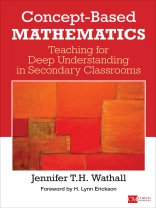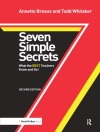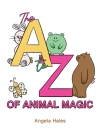Give math students the connections between what they learn and how they do math—and suddenly math makes sense
If your secondary-school students are fearful of or frustrated by math, it’s time for a new approach. When you teach concepts rather than rote processes, you show students math’s essential elegance, as well as its practicality—and help them discover their own natural mathematical abilities.
This book is a road map to retooling how you teach math in a deep, clear, and meaningful way —through a conceptual lens—helping students achieve higher-order thinking skills. Jennifer Wathall shows you how to plan units, engage students, assess understanding, incorporate technology, and even guides you through an ideal concept-based classroom.
- Practical tools include:
- Examples from arithmetic to calculus
- Inquiry tasks, unit planners, templates, and activities
- Sample assessments with examples of student work
- Vignettes from international educators
- A dedicated companion website with additional resources, including a study guide, templates, exemplars, discussion questions, and other professional development activities.
Everyone has the power to understand math. By extending Erickson and Lanning’s work on Concept-Based Curriculum and Instruction specifically to math, this book helps students achieve the deep understanding and skills called for by global standards and be prepared for the 21st century workplace.
’Jennifer Wathall’s book is one of the most forward thinking mathematics resources on the market. While highlighting the essential tenets of Concept-Based Curriculum design, her accessible explanations and clear examples show how to move students to deeper conceptual understandings. This book ignites the mathematical mind!’ — Lois A. Lanning, Author of Designing Concept-based Curriculum for English-Language Arts, K-12
’Wathall is a master at covering all the bases here; this book is bursting with engaging assessment examples, discussion questions, research, and resources that apply specifically to mathematical topics. Any math teacher or coach would be hard-pressed to read it and not come away with scores of ideas, assessments, and lessons that she could use instantly in the classroom. As an IB Workshop Leader and instructional coach, I want this book handy on a nearby shelf for regular referral – it′s a boon to any educator who wants to bring math to life for students.’ — Alexis Wiggins, Instructional Coach, IB Workshop Leader and Consultant
Innehållsförteckning
Preface
I. What is Concept-Based Curriculum and Instruction in Math? Research and Theory
1. Why Is It Important for My Students to Learn Conceptually?
2. What Are the Facts, Processes, and Concepts in Mathematics?
II. How to Craft Generalizations and Plan Units of Work to Ensure Deep Conceptual Understanding? A Practice Guide
3. How Do I Craft Generalizations for Mathematics?
4. How Do I Plan Units of Work for a Concept-Based Curriculum?
III. How Do We Engage Students Through Instructional Practice? Strategies to Engage and Assess
5. How Do I Captivate Students? Eight Strategies for Engaging the Hearts and Minds of Students
6. How Do I Know My Students Understand the Concepts? Assessment Strategies
7. How Do I Integrate Technology to Foster Conceptual Understanding?
8. What Do Ideal Concept-Based Math Classrooms Look Like?
Om författaren
Jennifer Wathall has been a teacher of mathematics for over 20 years. She graduated from the University of Sydney with a BSC majoring in Mathematics and she has completed postgraduate studies at The University of Hong Kong. She has worked in several international schools including South Island School, Hong Kong, The United Nations International School (UNIS, one of the original IB schools), New York and she is currently working at Island School, Hong Kong as Head of Mathematics. She is currently an honorary faculty advisor and part time instructor for The University of Hong Kong. In the international arena she has presented workshops such as “How to Effectively Integrate Multimedia into the Classroom” at the 21st Century Conference in Hong Kong and Shanghai and The Asian Technology Conference in Mathematics, Bangkok and Beijing. She has also given talks around Asia about how to effectively integrate a 1:1 program into the mathematics classroom. ?As a qualified International Baccalaureate workshop leader (“Mathematics, Concepts and Inquiry in the Diploma Program and Approaches to Teaching and Learning”) Jennifer has delivered numerous workshops in the Asia Pacific region. Her role as a field representative for the IB Asia Pacific serves as part of the quality assurance framework. She has consulted on IB Mathematics textbooks and has developed a Category 3 workshop on “The Use of the Casio GDC in IB Mathematics”. In 2014 she was invited to deliver a talk at the IB Asia Pacific Conference titled “Using Inquiry in the IB Mathematics Classroom” and in 2015 Jennifer will be presenting at the IB Americas annual conference. She is a certified trainer in the DISCtm behavior assessment tool and a certified independent consultant in “Concept Based Curriculum Design” by Dr H. Lynn Erickson. Jennifer works as a consultant helping math departments and schools transition to concept-based curriculum and instruction. She utilizes her skills as a certified Performance Coach to facilitate transition and change. For 2014 to 2019 she will be part of the external curriculum review group for IB Diploma Mathematics based in The Hague and Cardiff. ?Currently she is working with schools to transition towards a concept and inquiry based curriculum.












